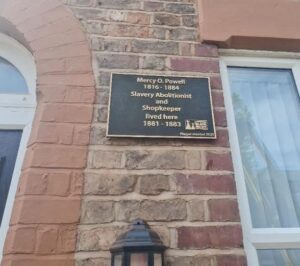Unveiling of a plaque to Mercy Powell - Slavery Abolitionist


On Saturday 26 April 2025, a commemorative plaque was unveiled at 42 Gwydir Street in Toxteth to honour the life and legacy of Mercy Powell, a pioneering female abolitionist whose contributions to the anti-slavery movement have long gone unrecognised.
Organised by the Liverpool Black History Research Group in partnership with the Liverpool Enslaved Memorial Project, the event marked a significant moment in LBHRG’s ongoing efforts to publicly acknowledge those who fought against slavery, and the contribution of Black people to the city’s history more generally.
Born in the USA, Mercy Powell, along with her husband William P. Powell, moved to Liverpool in 1851. The Powells established a home in the city to support formerly enslaved African Americans who had fled the United States via the Underground Railroad after the passing of the Fugitive Slave Act in 1850. Their home served as a sanctuary and organising hub for those seeking freedom and justice. The couple also founded an anti-slavery society in Liverpool, engaging in transatlantic activism at a critical moment in history.
In 1860, the family returned to the United States in the months before the start of the American Civil War. Mercy and William’s eldest son, also named William, would go on to serve as one of the very few Black qualified surgeons in the United States Army. He had earned his medical qualifications in Liverpool and worked at the Royal Infirmary before returning to America.
After William Sr. death around 1879, Mercy returned to Liverpool where she ran a shop and lived at 42 Gwydir Street from 1881 to 1883. She later moved to nearby Treborth Street, where she died in 1884. She was laid to rest in the Liverpool Necropolis.
Speaking on behalf of the Liverpool Black History Research Group, a spokesperson said:
“Female abolitionists were the unsung heroes of the movement and were absolutely instrumental in its success. Women like Mercy Powell were responsible for so much of the organising and campaigning, but their contributions have been downplayed as men were the ones given a public platform and therefore the spotlight.”
The plaque unveiling aims to shed light on this hidden history and inspire wider recognition of the vital roles played by women in Britain’s abolitionist past.
The event was open to the public and local residents were encouraged to attend. It is hoped that this tribute to Mercy Powell will spark renewed interest in Liverpool’s complex connections to the transatlantic slave trade, Liverpool’s historic Black community and the many courageous individuals who fought against slavery.